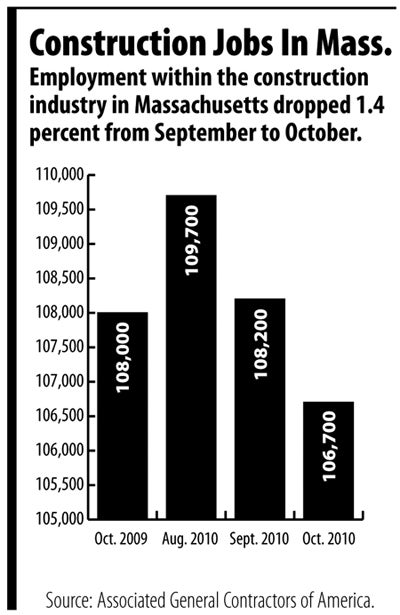Massachusetts lost 1,300 construction jobs between this October and last, according to a new report by the Associated General Contractors of America.
That added up to a 1.2 percent drop in employment in the industry, down to 106,700. But that was a smaller decline than 32 other states saw over the year.
Guy Webb, executive director of the Builders Association of Central Massachusetts, said he’s seen increased construction activity when it comes to residential remodeling, but in general the residential builders he represents aren’t doing much better than they were.
“The confidence factor, I guess you might call it, is certainly much better than it was a year ago,” he said. “But I wouldn’t say it’s great. It was so bad a year ago.”
“I think it’s still a very difficult market,” said Susan Mailman, president of Coghlin Electrical Contractors Inc. in Worcester.
Mailman said she anticipates a slight loosening in private construction, as well as some work to be had building new public schools. But she said there are still a large number of builders competing for every bid.
Along with the year-over-year decline, the AGC report also found that the state shed 1,500 jobs between September and October. Of course the industry typically slows down in winter, but Webb said the cold has more of an effect during years that were tough to begin with. That’s because new technology has made winter construction more feasible, but it’s still quite expensive.
“In this kind of market, the drop-off in the winter is really noticeable,” he said.
Webb said one of the only factors to budge employment on residential construction in recent years was the federal tax credit for homebuyers. He said he’s not sure of the long-term effect of the credit, since the incentive probably just pushed many buyers to get into the market earlier than they otherwise would have.
But Webb said the fact that a relatively minor incentive of $6,000 or $8,000 could convince people to jump into the market suggests that demand isn’t terribly depressed.
“I don’t think we need to see the economy in full recovery mode to see people spending money on housing again,” he said.

